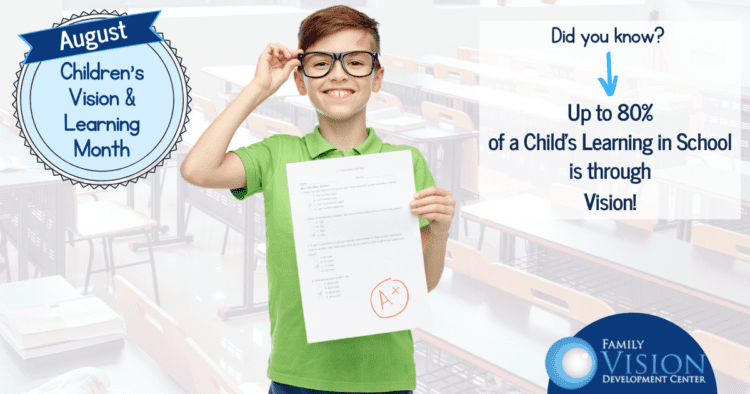

4 Startling Statistics that can Help Protect your Child’s Vision
August is Children’s Vision and Learning month! With a new school year quickly approaching, this is a great time to focus on the very important topic of your child’s vision. Parents may not be fully aware of the impact an undiagnosed vision issue can have on their child’s learning ability and the ability to succeed in school. Here are some surprising facts that bring to light just how important it is to properly care for your child’s vision.
1 in 10 Children has a Vision Problem Significant Enough to Impact Learning
That means over 5 million children in the United States alone. There are over a dozen visual skills that are essential for learning, and a disorder that affects any of them can cause serious challenges in school. These visual skills affect the way a child’s eyes work together as a team, control appropriate eye movements, allow for proper focusing, visual perception and more. A child’s vision depends on these skills for essential learning functions like reading and word comprehension, the ability to shift focus from close-up work to a blackboard at a distance, and the ability to maintain attention.
20/20 Vision Does Not Necessarily Mean Perfect Vision
When we hear the term “20/20 vision” we usually assume that means there are no vision issues to be concerned about. But contrary to popular belief, 20/20 does not actually equal perfect. In fact, a child with 20/20 vision may still have issues with focusing, coordinating or tracking functions. 20/20 simply means that a child is capable of seeing clearly at a distance of 20 feet. Unfortunately, important functions such as reading and learning typically occur at a distance of eleven to sixteen inches from the face. A 20/20 assessment may give parents a false sense of security about their child’s vision, possibly leaving significant vision issues to go untreated.
Typical Vision Screenings can Miss at Least 50% of Vision Problems
A standard vision screening, which is typically administered at school, is a good preliminary test that can often identify kids that need to see an eye doctor for further examination. However, a screening is very limited in what it can detect and many serious vision issues can go undiagnosed when this is the only vision exam a child receives. In order to actually diagnose a vision disorder, your child will need a comprehensive vision exam. This type of eye exam will explore your child’s vision at a much more comprehensive level, to include medical history, eye dilation to examine the retina and more in-depth testing to diagnose subtle issues that would not be discovered in a screening alone.
A Child’s Vision Problems can be Misdiagnosed with ADD / ADHD
When a child exhibits certain symptoms in a school setting, such as a short attention span, taking too long to do homework, or poor reading comprehension skills, they are often immediately diagnosed with Attention Deficit Disorder (ADD) or Attention Deficit Hyperactivity Disorder (ADHD). This is because the symptoms of ADD / ADHD are very similar to those of many vision issues. In many instances, children are incorrectly diagnosed with ADHD, and started on medication, even though vision problems, like convergence insufficiency, are the root of the trouble. In cases of an ADHD diagnosis, a child’s vision should be thoroughly examined before a final determination is made.
At Family Vision Development Center, we are dedicated to helping our young patients achieve the healthiest vision possible. Take this opportunity to schedule a comprehensive vision exam for your child in order to give them the best chance at success in school and in life! Contact our Aurora office at 630-862-2020 to schedule your appointment.


Family Vision Development Center is a full-service vision center offering innovative vision therapy services, post-concussive vision rehabilitation, comprehensive vision exams for eyeglasses and contact lenses, management of ocular diseases including glaucoma, diabetes, macular degeneration and cataracts, and a state-of-the-art optical center offering the latest designs in eyewear. We are dedicated to keeping our patients comfortable and well-informed and we will explain every exam and procedure and answer all of your questions. We accept both scheduled and emergency appointments, and offer convenient financing and insurance options to ensure that high-quality vision care is available and affordable to all of our patients.
Learn more about learning-related vision problems at https://www.covd.org/page/learning
